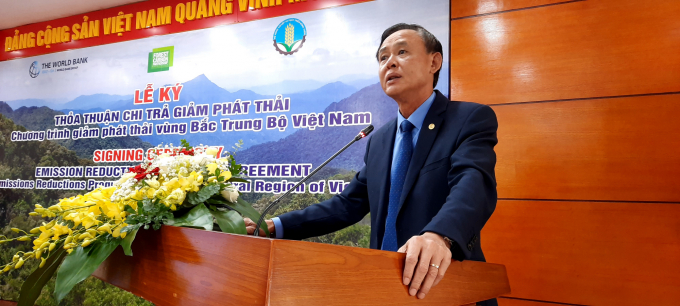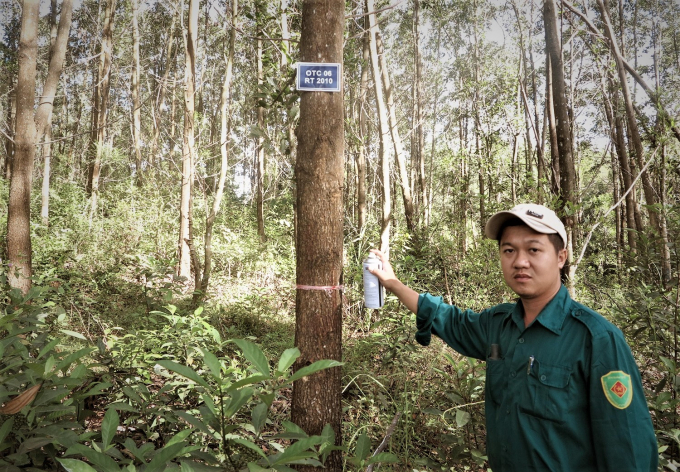May 21, 2025 | 05:37 GMT +7
May 21, 2025 | 05:37 GMT +7
Hotline: 0913.378.918
May 21, 2025 | 05:37 GMT +7
Hotline: 0913.378.918

The ERPA affirmed Vietnam’s international reputation, said Permanent Deputy Minister of MARD, Ha Cong Tuan. Photo: Tung Dinh.
According to the plan, on October 22, 2020, the Ministry of Agriculture and Rural Development (MARD) and the World Bank (WB) - the trustee agency of the Forest Carbon Partnership Facility (FCPF) - will sign the Emission Reduction Purchase Agreement (ERPA) in Viet Nam’s North Central region.
According to this agreement, Vietnam will transfer to FCPF 10.3 million tons of CO2 emission reduction from forests in 6 North Central provinces of Thanh Hoa, Nghe An, Ha Tinh, Quang Binh, Quang Tri and Thua Thien - Hue for the period 2018 - 2024. FCPF will pay US$ 51.5 million for this service, of which US$ 15 million is expected in 2021; US$ 20 million in 2023 and US$ 16.5 million in 2025.
Vietnam is a member of the United Nations Framework Convention on Climate Change. According to Permanent Deputy Minister of Agriculture and Rural Development Ha Cong Tuan, Vietnam has committed to reduce greenhouse gas emissions by 8% by 2030 compared to 2015 (by itself). With effective cooperation from other organizations and countries, Vietnam will commit to reducing greenhouse gas emissions by up to 25% by 2030 compared to 2015.
The Forest Carbon Partnership Facility (FCPF) was founded by the United Nations. In 2018, the FCPF recognized that Vietnam had basically been ready to start reducing emissions from deforestation and forest degradation (REED +). Vietnam’s efforts to implement REED + were highly appreciated internationally with its National Program on REED + implementation, legalizing this issue in the Law on Forestry 2017.
In 2018, MARD and the FCPF signed a protocol that Vietnam will be the first country to implement the payment of FCPF based on the results it achieved.
According to Ha Cong Tuan, the signing of ERPA benefits Vietnam a lot.
Firstly, it shows Vietnam’s determination to reduce deforestation and forest degradation. Along with that is the efforts to decide on the price of greenhouse gas emission reduction, which is recognized by the international community.
Secondly, the signing of the ERPA will promptly replenish new and stable financial resources to support the protection and development of forests, especially in 6 North Central provinces.

The ERPA will promptly supplement resources for forest protection, development and improvement in the six northern central provinces. Photo: TL.
If Vietnam fulfills this commitment, from now to 2025, the 6 North Central provinces will reduce 10.3 million tons of CO2 emissions, and the FCPF will pay about US$ 51.5 million. This is a very meaningful resource for the central provinces. Together with other UN pilot projects, it serves to reduce greenhouse gas emissions, and to enforce the carbon credit market across the globe.
With the ERPA, Vietnam will be the fifth country in the world to sign an agreement with the FCPF, and the first country in the Asia-Pacific to sign this agreement. This affirms Vietnam’s international reputation and helps Vietnam a lot in implementing the payment of carbon services legally.

(VAN) Oliyar, a prominent Ukrainian oil and fat manufacturer, has revealed plans to build a farm for 2.3 million laying hens in the Lviv region. The additional production quantities promise to change the competitive landscape of the egg market of the Eastern Europe region.

(VAN) On May 15, Ministry of Agriculture and Environment of Vietnam hosted the 'Connecting Vietnam - Germany agricultural, forestry and fishery trade' seminar in Berlin, Germany.

(VAN) In the face of counterfeit and imitation products, Khanh Hoa Salanganes Nest Company hopes for the prompt completion of the legal framework, strict enforcement against violations, and protection of the bird’s nest brand.

(VAN) Japan's efforts to lower the price of rice through the release of its stockpile may finally be making some progress, albeit at a snail's pace.

(VAN) U.S. tariffs are not only a 'shock', but also an opportunity for Vietnamese businesses to renew their mindset toward comprehensive development.

(VAN) As Bac Giang lychee enters the harvest season, Minister Do Duc Duy expects that the fruit will contribute greatly to agricultural exports due to standardized production and deep processing.

(VAN) Consumers have shown a preference for free-range eggs, but those farming systems are more vulnerable to biosecurity risks like bird flu.